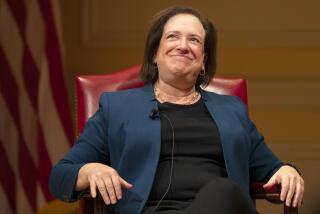Bird Court’s Decision Under Attack : Murder Ruling May Lead State to Reopen ’83 Case
SAN FRANCISCO — The U.S. Supreme Court decision permitting capital punishment to be imposed without a finding of intent to kill may lead the California Supreme Court to reverse a controversial 1983 ruling that otherwise could result in dozens of retrials, legal authorities said Tuesday.
Ruling in an Arizona case, the federal court held that it is constitutional to sentence a defendant to death who plays a major role in a crime resulting in murder and does so with “reckless indifference” to human life--even if he himself neither actually killed the victim nor specifically intended that a killing be committed.
The 5-4 majority substantially modified a previous ruling that had served as a basis for the 1983 holding by the state Supreme Court in the case of Carlos vs. Superior Court. In that case, the state court barred the death penalty or life without parole unless a jury found that the defendant had intended to kill.
14 Reversals, So Far
The Carlos decision and another decision a year later by the court under Chief Justice Rose Elizabeth Bird resulted in the subsequent reversal of 14 death penalties and, if it is not overturned, could require reversals of 29 more, according to state prosecutors.
The California court, in a 6-1 decision written by Justice Allen E. Broussard, based the 1983 ruling primarily on two factors: its analysis of a 1978 state ballot measure expanding the death penalty law enacted by the Legislature a year earlier and its interpretation of a 1982 ruling by the U.S. Supreme Court that had refused to allow the execution of the driver of a getaway car in a robbery in which a murder was committed by his co-defendants.
The court said that while the wording of the ballot measure was not clear, there was nothing in ballot arguments sent to the voters indicating that the initiative was meant to allow the death penalty to be imposed on accidental killers.
The justices said further that if the ballot measure were interpreted to allow the death penalty without a finding of intent, it could “encounter substantial constitutional problems” under the 1982 high court decision as a violation of Eighth Amendment prohibitions against “cruel and unusual punishment.”
Tuesday’s U.S. Supreme Court ruling was hailed by state prosecutors as adding perhaps decisive support to an effort by state Atty. Gen. John Van de Kamp to obtain a reversal of the 1983 decision from a state Supreme Court that is much more conservative than it was when the ruling was issued under Bird. They said that supplemental briefs would be filed soon with the court, citing the new ruling as a conclusive indication that the state court’s previous interpretation of federal law was erroneous.
Tuesday’s ruling “certainly seems to support our position that there need not be intent to kill in order to impose the death penalty,” said Ward A. Campbell, the deputy attorney general who is representing the state in a key case on the issue now pending before the justices.
“To the extent that the Carlos decision was based on concern over the (federal) constitutionality of such a result, that concern was misplaced,” he said.
‘Looks Awfully Good’
Herbert Wilkinson, the deputy attorney general who coordinates death penalty cases for the state, added: “It remains to be seen what the state Supreme Court will do now--but it looks awfully good to me.”
On the other side, Deputy Public Defender Cynthia A. Thomas said that she is still hopeful the state court will continue to require intent to be found under state law, even if it is not mandated under the federal Constitution.
“But if the California Supreme Court finds that the Carlos decision was based just on federal law, the result is obvious--it’s going to overturn that decision,” she said.
More to Read
Sign up for Essential California
The most important California stories and recommendations in your inbox every morning.
You may occasionally receive promotional content from the Los Angeles Times.










